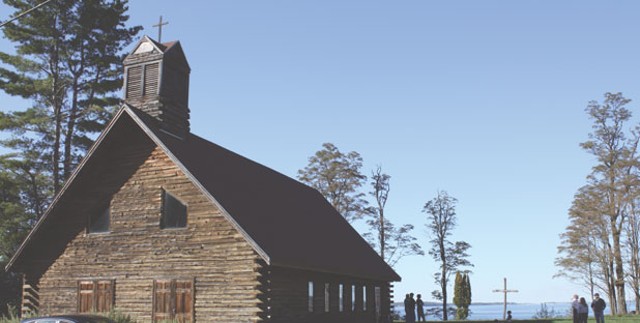Published September 21, 2011 at 11:38 a.m.
On Tuesday, October 4, Colchester voters will decide whether to buy 27 acres of undeveloped lakefront real estate for $4.5 million taxpayer dollars. The special election will likely be the town’s only chance to purchase the former Camp Holy Cross property on Malletts Bay from the Roman Catholic Diocese of Burlington.
The vote follows an earlier one, on Town Meeting Day 2010, when voters narrowly approved a plan to allow the selectboard to negotiate a purchase price. Since then, the diocese has dropped its asking price from $10 million to $4.5 million. Proceeds from the sale of the land, which for five decades hosted camps for Catholic youth and kids with cancer, will compensate victims of priest sex abuse.
But many questions remain unanswered about the property, including its actual market value and liabilities, the cost of necessary improvements, and potential future uses. In the last 18 months, the town has done little due diligence on the property. For example: Informational literature distributed by the town last week claims the parcel has “1600 feet of beach on Malletts Bay.” Tax maps calculate the shoreline length at approximately 975 feet.
After a recent open house on the land, the selectboard agreed to form a Camp Holy Cross “vision committee” to get some answers. Facilitating is Paul Simon, a landscape architect who lives on Mills Point. Simon reports that the committee of 20 to 30 residents includes residents both for and against the proposal. Others, like him, are undecided.
“Having a mix of ‘no’ votes and ‘yes’ votes in there is fantastic because we’re trying to tackle all these issues,” he explains. “We get all those ‘no’ votes telling us why they’re voting ‘no’… so we have people out there looking for answers.
“The problem is,” he adds, “we only have a little time left.”
Committee member Moe Germain, who owns the Moorings marina on Malletts Bay, is dead set against the deal. Asked why, he laughs cynically: “Where should I begin?”
Chief among Germain’s concerns is the cost: Even at its discounted price, he claims the land is still “significantly overpriced” by about $2 million. Germain also says that “severe limitations” on the property, including the presence of sand plains and endangered species, will restrict the town’s ability to develop it into a multiuse park.
Germain points out that the debt service on the 20-year bond — about $300,000 annually for the first five years — would leave the town little, if any, money left over to make necessary improvements, such as widening the entrance road for emergency vehicles and installing ADA-accessible ramps to the beach.
In short, Germain says, Colchester can’t afford this. With the third-highest property tax rate in Chittenden County and the third-lowest average family income, he asserts, many residents simply cannot absorb an extra $30 to $50 per year on their tax bill.
“This is a lemon,” Germain concludes, “and they’re trying to make lemonade out of it.”
But Sam Conant, a mental health professional who also serves on the vision committee, calls the Holy Cross parcel “a gem” that’s far too valuable to pass up. Conant says he’s heard the “doom-and-gloom” predictions from naysayers, but says that many of their issues can and are being addressed.
For example, Conant suggests that if a ramp to the waterfront is required, an Eagle Scout troop could build it. He points out that for years the entrance road has been wide enough to service summer camps with very sick kids.
As for improvement costs, Conant points to the “hundreds” of foundations and private trusts that could potentially support a project like this one. He likens it to the Burlington bike path, which some neighbors opposed on grounds it would attract criminal activity. None of their fears ever materialized, Conant notes, and today the bike path is a valuable selling point for homeowners along its route. Camp Holy Cross, he predicts, will do the same thing for Colchester.
“Right now, there are a lot of people saying, ‘Those people [who support purchasing the camp] are really stupid,’” he adds. “But 25 years from now, people will be saying, ‘Boy, those people must be geniuses to get this place!’”
If Colchester voters do reject this deal, as some predict, it may be in part because of a recent citywide reappraisal. Many residents saw their tax bills increase dramatically for the first time in years — though 58 percent will actually pay less than they were before, according to town manager Al Voegele.
The town is involved in another pricey project, too: repairing the Colchester Causeway, which was damaged in the spring floods. FEMA promised to pay 75 percent; both the state and the city of Colchester are on the hook for 12.5 percent.
These and other hindrances help explain why, on Tuesday, the Colchester Community and Economic Development Advisory Council formally recommended that citizens vote against this purchase and the town continue negotitions with the seller. CEDAC called it “fiscally imprudent” to assume nearly $7 million in new debt plus upfront improvement costs estimated at $1 million or more.
Meanwhile, the town just hired PMG, a Burlington public relations firm cofounded by Colchester resident Nicole Ravlin, to get the word out on social media about the vote and the history of the property. Some residents, including supporters of the Holy Cross purchase, are wondering why PMG’s $15,000 fee didn’t go to pay for a feasibility study instead.
Judging from last year’s election, which was decided by just 91 votes, Voegele predicts another close one. “I know that, whatever the decision is, half the population is not going to be happy with it.”
More By This Author
Speaking of Local Matters, local Issues
-

At the Junction of State and Federal Law, I-91 Checkpoint Becomes Site of Legal Collision
Feb 5, 2014 -

Maple Makeover? Vermonters Discover a New Sugaring Technique
Feb 5, 2014 -

Disharmony on Prospect Street: A Dispute Between Neighbors Strikes a Sour Note
Feb 5, 2014 -

Treatment or Trial? Growing 'Rapid-Intervention' Program Gives Addicted Offenders a Choice
Jan 29, 2014 -

Raw Deal? Farmers Push Back Against Unpasteurized Milk Regulations
Jan 29, 2014 - More »
Comments
Comments are closed.
From 2014-2020, Seven Days allowed readers to comment on all stories posted on our website. While we've appreciated the suggestions and insights, right now Seven Days is prioritizing our core mission — producing high-quality, responsible local journalism — over moderating online debates between readers.
To criticize, correct or praise our reporting, please send us a letter to the editor or send us a tip. We’ll check it out and report the results.
Online comments may return when we have better tech tools for managing them. Thanks for reading.















































